by dapp | Feb 2, 2020 | Blog, News
Misconceptions, myths and negative attitudes are the major barriers hindering people with disability from participating fully and effectively in their communities on an equal basis with their peers, says Development Aid from People to People (DAPP)programmes co-ordinator Mr Petros Muzuva.
Speaking during the training of councillors and traditional leaders in Bindura and Shamva on disability issues, Mr Muzuva said some of the myths and stereotyping are rooted in traditional and religious beliefs.
He added that some people believed that disability was a result of bad luck, avenging spirits and superstition.
“The objective of the training is to ensure that our traditional and local leaders mainstream disability issues,” said Mr Muzuva.
“Traditional and local leaders are key in development issues hence the need to understand and interpret the United Nations Convention for Rights of People with Disabilities (UNCRPD) on issues of people with disability (PWD) so that they can incorporate them in community development plans.
“Myths and misconceptions have resulted in some parents and guardians of PWDs being ashamed of letting them go out in public or taking them for rehabilitation. Together we can remove barriers and raise awareness on issues affecting PWDs with an inclusive understating of having their rights being accorded.
“Our objective is to see committees of PWDs being created starting at ward level. The intention is to have a holistic approach when we discuss issues of development. PWDs should not be left out in community development, hence the need for their participation in developmental meetings.
“During registration of PWDs we compiled information in Bindura and came up with a total number of 718 people with disabilities across all age groups. Three hundred and seventy-seven of the 718 are between the ages of 15-35, which is our target group in the programme dubbed Youth Actions on Implementation and Monitoring of Disability Rights in Zimbabwe funded by the European Union.”
Chief Musana urged all councillors to put their political differences aside and work together towards the development and inclusion of PWDs.
“Councillors are the ones with people on the ground, we need to come together and unite regardless of our political affiliations,” said Chief Musana.
“Let’s go back to our wards and teach people of the correct terminology when referring to PWDs. The most important thing is to teach people that we are equal. As traditional leaders we have already started including PWDs in everything we do.”
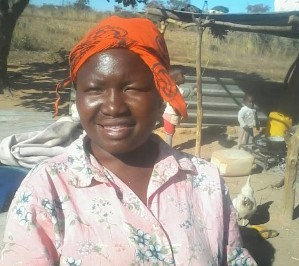
by dapp | Aug 6, 2019 | Blog, News
Faith Gunda Testimonial
My name is Faith Gunda from Rusape in Zimbabwe. I am a Tuberculosis survivor. When I fell ill I didn’t know what was wrong with me. Being from a rural area I didn’t visit a hospital but just bought pain killers and prayers but nothing seemed to be working. I was losing weight and constant chest pains. It was only after Madam Makona, a DAPP community volunteer and Mr Nyanhongo, came home and sensitised me and my family on the signs, symptoms and treatment of TB that I understood what was wrong with me. After some convincing I gave them a sputum sample that was taken to the hospital for testing. After a few days the results from the hospital came and I was informed I had to undergo an xray test at the local clinic. The X-ray test together with the sputum tests showed that I had tested positive for Tuberculosis. The Field Officer together with the nurse explained the treatment options and I started taking TB medicine.
When I went to the clinic , my husband went with me and together we were informed about the importance of support when taking the medicine. The Field officer introduced us to what they call a TRIO treatment support which would be comprised of me the patient ,my husband and the field officer. This Trio was meant to support me during the time I will be taking my medicine to ensure that it is done on time and consistently.
We were also told that my whole family must be tested for TB. Kelvin,my husband, and children, Patience (2 years), Darlington (7 years) and Farai (1.6 years) went for X-ray tests and were found to be having TB. It was a difficult time for my family. But we support each other and the Field Officer stood by our side and visited us often to make sure we were taking our medicine correctly.
We started taking the medication and we started recovering. I personally am now fit and I do help my spouse and family. I gratefully appreciate DAPP Zimbabwe for coming to my family’s rescue. If it was not for this organisation, early death would have been the fate of my family and I.
DAPP Zimbabwe is currently implementing the Total Control of Tuberculosis and HIV Integrated program which is responding to the burden of TB and HIV in Makoni District in Zimbabwe. The project is working to combat tuberculosis and HIV in the area, to reduce stigma and discrimination related to TB and HIV infections as well as increasing awareness, diagnosis and treatment services. This is done through targeted case finding done at community and household levels. TC TB Makoni uses the door to door approach and encourage people to get tested.

by dapp | Jun 13, 2019 | Blog, News
1000 vulnerable households from the Cyclone Idai affected areas received food aid under the CISU/DERF Humanitarian intervention to Cyclone Idai in Zimbabwe Chimanimani Emergency program. Speaking at the hand over event at Chiyamiti community centre, DAPP Zimbabwe Country Director Mathias Paradzai said the assistance is part of wider relief efforts that will see the rehabilitation and reconstruction of water and sanitation facilities. “Together with our technical partner UFF Denmark, DAPP Zimbabwe will be working in Ward 6 and part of Ward 9 to construct 150 latrines and rehabilitate 20 boreholes. He added that the assistance took into account the dietary needs of babies and sanitary wear for women who sometimes are forgotten in times of crisis.
Beneficiaries especially mothers expressed their gratitude for the timely gesture. “We were starving in this area, it was hard to watch our children go without food and not knowing what to do”
Tendai Mukuti who lives with a disability also thanked DAPP for the assistance saying ” The situation for people with disabilities was made worse by this disaster. I want to thank DAPP for giving me hope and somewhere to start from”
Women who received sanitary wear said their needs are sometimes forgotten in emergency situations and yet they are part of their monthly needs. “ Sanitary wear is a challenge and most women were resorting to using old rags to get through their menstrual cycles. We are grateful to DAPP for including pads as part of their assistance to us.
A total of 150 households will receive building material to construct pit latrines to promote health and hygiene while 20 community boreholes will be rehabilitated through the financial support of the Civil Society in Development (CISU) / Danish Emergency Relief Fund (DERF)
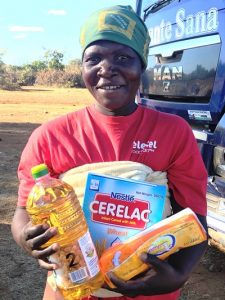
Beneficiary is all smiles after receiving food assistance
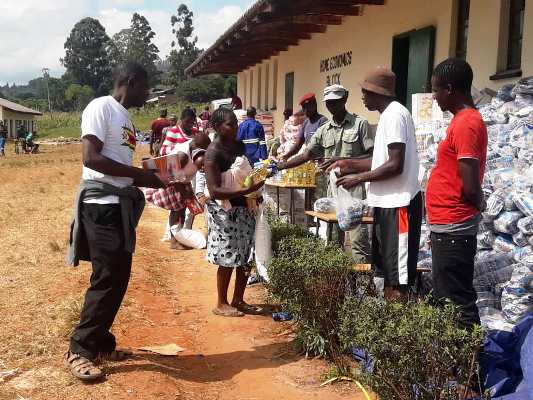
by dapp | Jun 3, 2019 | Blog, News
In response to the devastating effects Cyclone Idai, Development Aid from People to People Zimbabwe and UFF Denmark have started an emergency response program to assist 4000 people access safe water and sanitary facilities as well as emergency food assistance. The 4 month intervention will be carried out in ward 6 of Chimanimani, Manicaland Province
Priority has been given to the rehabilitation of water and sanitary facilities to reduce the increasing risk of water-borne diseases brought about by the flooding. So far DAPP Zimbabwe has mobilised the people in preparation for community recovery and rebuilding of 20 boreholes and construction of 150 pit latrines. Through engaging trained pump minders to lead the rehabilitation process communities will be encouraged to take ownership of their facilities.
DAPP will also distribute aqua tablets and water buckets to 1000 households to meet immediate access to safe water while the rehabilitation and construction work is going on. The community active involvement in project activities will ensure sustainability and scaling up of activities
Cyclone Idai eroded household savings and halted income generating opportunities. To help families recover DAPP Zimbabwe will be responding to the emergency needs of the people through provision of emergency food and non food items to the target households. Through coordinated efforts, 1000 households will be assisted to meet their immediate food and nutrition needs for 4 months.
The emergency response is made possible by the Danish Emergency Relief Fund (DERF) /Civil Society in Development (CISU) which is an independent association of Danish Civil Society Organisations that are involved in development work in Asia, Africa or Latin America
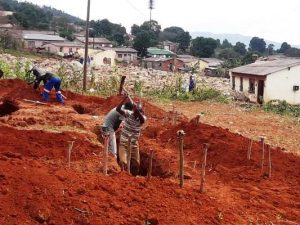
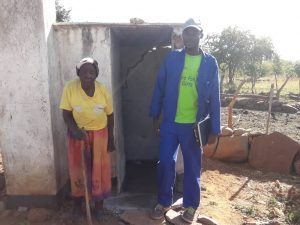

by dapp | May 23, 2019 | Blog, News
Green leafy vegetables provide essential vitamins and minerals that are important for a healthy diet. Garden Farming in Makoni has been doing just that. Families involved in the GAIA funded Farmers’ clubs program have been able to address food insecurity and improve the health of families by tackling malnutrition. Throughout the year families that established nutrition gardens have increased their resilience and prevented malnutrition .
Grace Mupoperi , a member of the Mabvazuva garden group has seen the benefits of nutrition gardens on the health of her 6 children “Gardens are a source of nutritious food for my children. I see that they don’t fall sick as often as they used to before I had my own garden. We grow different varieties of vegetables that even give us income as we sell them to others in the community ”
Farmers in the project organised themselves into 24 groups and they join their forces, ideas and resources so that they can further the agricultural production of each member. Families make use of seed sharing and organic manures which produce quality vegetable varieties. This coupled with adopting best farming practices methods such as crop diversification, compost making, mulching and crop rotation farmers are giving their families the much needed nutritional diversity.
Gardening farming not only contributes to household food security but it is also providing extra family income from the sale of surplus produce to the local community. Families with gardens usually produce more than enough for their families and the rest is sold and the income is used for medical expenses, school fees, savings and other home improvements requirements.
The Farmers club program funded by Gaia Movement aims to enhance 1 200 farmers’ resilience to current and future climate related shocks and protect the environment in Makoni district thereby making them food, nutrition and income secure all year round. This organised Farmers’ Clubs allow them to be better prepared against current and future climate change related shocks
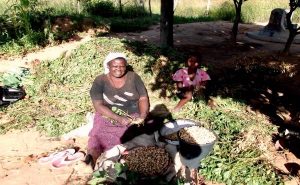
Bumper garden produce for the family








